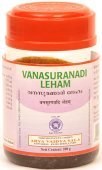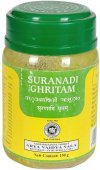Takra: 19 definitions
Introduction:
Takra means something in Hinduism, Sanskrit, Marathi, Hindi. If you want to know the exact meaning, history, etymology or English translation of this term then check out the descriptions on this page. Add your comment or reference to a book if you want to contribute to this summary article.
In Hinduism
Ayurveda (science of life)
Rasashastra (Alchemy and Herbo-Mineral preparations)
Source: archive.org: Rasa-Jala-Nidhi: Or Ocean of indian chemistry and alchemyTakra (तक्र) refers to “Butter milk”. (see the Rasajalanidhi by Bhudeb Mookerji volume 3)
Dietetics and Culinary Art (such as household cooking)
Source: Shodhganga: Dietetics and culinary art in ancient and medieval India1) Takra (तक्र) refers to the “butter milk”, and is commonly found in literature dealing with the topics of dietetics and culinary art, also known as Pākaśāstra or Pākakalā.—Curds was widely used in Vedic period. Ṛgveda mentions a preparation in which the curds were mixed with Soma juice and barley meal. [...] According to Om Prakash, the cream of milk (santānikā), the cream of curds (sara), whey (mastu), fresh butter (navanīta), clarified butter (ghṛta) and the butter milk (takra) are all referred to in Ayurvedic preparations. Curds churned without water (ghola) is referred to in Suśrutasaṃhitā.
Takra or “buttermilk” and is classified as a ‘light foodstuff’ as opposed to dadhi (curds) according to the Bhojanakutūhala.—Heavy food should [viz., takra] to be eaten only until one is half satisfied. Light food [viz., dadhi] can be eaten until the full satisfaction is obtained. A man whose digestive fire is weak, should abandon heavy food.
Takra (buttermilk) is mentioned in a list of remedies for indigestion.—A complete section in Bhojanakutūhala is devoted for the description of agents that cause indigestion [viz., kṣīrabhava]. These agents consumed on a large scale can cause indigestion for certain people. The remedies [viz., takra (buttermilk)] for these types of indigestions are also explained therewith.
Takra (buttermilk) is also mentioned as a remedy for indigestion caused by sarpis (ghee).
2) Takra (तक्र) or “curds” is mentioned as being incompatible mutually incompatible (viruddhāhāra) with the Kadali (plantain) foodstuff, according to the 17th century Bhojanakutūhala in the dravyaguṇāguṇa-kathana, which contains the discussions on different food articles and their dietetic effects according to the prominent Ayurvedic treatises.
Veterinary Medicine (The study and treatment of Animals)
Source: Asian Agri-History: Paśu Āyurvēda (Veterinary Medicine) in GaruḍapurāṇaTakra (तक्र) refers to “butter milk”, and is used in the Viśodhana (“washing off the wound’s impurities”) of wounds (vraṇa), according to Āyurveda sections in the Garuḍapurāṇa.—[...] After Viśodhana (wash off the ulcer's/wound's impurities by medicated decoction), the following formulations can be used for śodhana (purification) and ropaṇa (healing) externally:—[... e.g.,] The eraṇḍa-mūla (Castor root), two types of haridrā (Turmeric), Citraka (Plumbago zeylanica), Viśvabheṣaja (Zingiber officinale), Rasona (Allium sativum) and saindhava (rock salt) are ground well with takra (butter milk) or kāñjī (sour gruel). [...]
Toxicology (Study and Treatment of poison)
Source: Shodhganga: Kasyapa Samhita—Text on Visha ChikitsaTakra (तक्र) refers to “buttermilk”, and is the name of an ingredient used in the treatment of snake-bites such as those caused by the Asṛṅmaṇḍalī-snakes, according to the Kāśyapa Saṃhitā: an ancient Sanskrit text from the Pāñcarātra tradition dealing with both Tantra and Viṣacikitsā—an important topic from Āyurveda which deals with the study of Toxicology (Viṣavidyā or Sarpavidyā).—Accordingly, one of the treatments is mentioned as follows: “A lehya (paste for licking) of Kuṣṭha, curd, Trikaṭu, salt, buttermilk (takra) and honey [takrotthamākṣikam] must be given to the victim. A powder of the root of Nīlī and Neem tree must be mixed with water and drink. The same can be boiled and taken as decoction or paste of neem bark and milk can be used as pāna and Lepa. [...]”.
Unclassified Ayurveda definitions
Source: archive.org: Vagbhata’s Ashtanga Hridaya Samhita (first 5 chapters)Takra (तक्र) refers to “buttermilk”, as mentioned in verse 5.33-34 of the Aṣṭāṅgahṛdayasaṃhitā (Sūtrasthāna) by Vāgbhaṭa.—Accordingly, “[...] Buttermilk [viz., takra] (is) light, astringent, sour, (and) digestive; (it is) destructive of phlegm and wind (and) destroys cutaneous and abdominal swellings, hemorrhoids, dysentery, retention of urine, anorexia, splenomegaly, visceral induration, ghee(-caused) diseases, factitious poison, and jaundice”.
Note: Takra (“buttermilk”) has been translated by dar sar (“fresh buttermilk”), sar being a short form of gsar(-ba).
Source: gurumukhi.ru: Ayurveda glossary of termsTakra (तक्र):—Buttermilk - Adding 1 / 4th of water to Madhita, Prepared by churning the curd and removing butter from it.

Āyurveda (आयुर्वेद, ayurveda) is a branch of Indian science dealing with medicine, herbalism, taxology, anatomy, surgery, alchemy and related topics. Traditional practice of Āyurveda in ancient India dates back to at least the first millenium BC. Literature is commonly written in Sanskrit using various poetic metres.
Languages of India and abroad
Marathi-English dictionary
Source: DDSA: The Molesworth Marathi and English Dictionarytakra (तक्र).—n S Buttermilk.
Source: DDSA: The Aryabhusan school dictionary, Marathi-Englishtakra (तक्र).—n Buttermilk.
Marathi is an Indo-European language having over 70 million native speakers people in (predominantly) Maharashtra India. Marathi, like many other Indo-Aryan languages, evolved from early forms of Prakrit, which itself is a subset of Sanskrit, one of the most ancient languages of the world.
Sanskrit dictionary
Source: DDSA: The practical Sanskrit-English dictionaryTakra (तक्र).—Butter-milk; Manusmṛti 8.326; Y.3.37,321; तक्रं शक्रस्य दुर्लभम् (takraṃ śakrasya durlabham) Subhāṣ.
Derivable forms: takram (तक्रम्).
Source: Cologne Digital Sanskrit Dictionaries: Shabda-Sagara Sanskrit-English DictionaryTakra (तक्र).—n.
(-kraṃ) n. Buttermilk with a fourth part water. E. tak to bear (sickness), Unadi affix rak.
Source: Cologne Digital Sanskrit Dictionaries: Benfey Sanskrit-English DictionaryTakra (तक्र).—i. e. tañc + ra n. Buttermilk mixed with water, [Mānavadharmaśāstra] 8, 326.
Source: Cologne Digital Sanskrit Dictionaries: Cappeller Sanskrit-English DictionaryTakra (तक्र).—[neuter] buttermilk (mixed with water).
Source: Cologne Digital Sanskrit Dictionaries: Monier-Williams Sanskrit-English Dictionary1) Takra (तक्र):—[from takman] n. ([gana] nyaṅkv-ādi) buttermilk mixed with (a third part of) water, [Manu-smṛti viii, 326; Yājñavalkya iii, 37 & 322; Harivaṃśa] etc.
2) Takrā (तक्रा):—[from takra > takman] f. = krākvā, [cf. Lexicographers, esp. such as amarasiṃha, halāyudha, hemacandra, etc.]
Source: Cologne Digital Sanskrit Dictionaries: Yates Sanskrit-English DictionaryTakra (तक्र):—(kraṃ) 1. n. Butter-milk with a fourth part of water.
Source: DDSA: Paia-sadda-mahannavo; a comprehensive Prakrit Hindi dictionary (S)Takra (तक्र) in the Sanskrit language is related to the Prakrit word: Takka.
[Sanskrit to German]
Sanskrit, also spelled संस्कृतम् (saṃskṛtam), is an ancient language of India commonly seen as the grandmother of the Indo-European language family (even English!). Closely allied with Prakrit and Pali, Sanskrit is more exhaustive in both grammar and terms and has the most extensive collection of literature in the world, greatly surpassing its sister-languages Greek and Latin.
Hindi dictionary
Source: DDSA: A practical Hindi-English dictionaryTakra (तक्र):—(nm) butter-milk.
...
Kannada-English dictionary
Source: Alar: Kannada-English corpusTakra (ತಕ್ರ):—[noun] the liquid left after churning butter from curd; buttermilk.
Kannada is a Dravidian language (as opposed to the Indo-European language family) mainly spoken in the southwestern region of India.
See also (Relevant definitions)
Starts with (+8): Takrabali, Takrabhaksha, Takrabhakta, Takrabhid, Takrahva, Takrakalpa, Takrakka, Takrakurccika, Takrakurchchika, Takrakurchika, Takrakurcika, Takramamsa, Takramandura, Takrana, Takranu, Takrapanaka, Takrapanavidhi, Takraparyayavacaka, Takrapinda, Takrara.
Ends with: Mahishatakra, Mahishitakra, Meshitakra.
Full-text (+54): Takrata, Takramamsa, Takrakurcika, Takrasara, Takrabhid, Takrakurccika, Vibhagabhinna, Takrahva, Takrapinda, Takka, Sarjaka, Katvara, Takrabhakta, Takkiram, Khada, Shattakrataila, Mahashattakrataila, Paramarasa, Katura, Sitabha.
Relevant text
Search found 20 books and stories containing Takra, Takrā; (plurals include: Takras, Takrās). You can also click to the full overview containing English textual excerpts. Below are direct links for the most relevant articles:
Garga Samhita (English) (by Danavir Goswami)
Verse 1.17.19 < [Chapter 17 - Description of the Yogurt Theft]
Verse 8.13.101 < [Chapter 13 - A Thousand Names of Lord Balarāma]
Amarakoshodghatana of Kshirasvamin (study) (by A. Yamuna Devi)
Daily Life (1): Food and Drinks < [Chapter 3 - Social Aspects]
Vakyapadiya of Bhartrihari (by K. A. Subramania Iyer)
Verse 2.347 < [Book 2 - Vākya-kāṇḍa]
The Garuda Purana (by Manmatha Nath Dutt)
Chapter CCXVI - Medical treatment of the diseases of cows, etc. < [Dhanvantari Samhita]
Chapter CCXVIII - Various Recipes of fumigation-compounds, etc. < [Dhanvantari Samhita]
Chapter CCXIII - Other Medicinal Recipes (continued) < [Dhanvantari Samhita]
Sushruta Samhita, volume 4: Cikitsasthana (by Kaviraj Kunja Lal Bhishagratna)
Chapter VI - The medical treatment of Hemorrhoids
Chapter IX - The medical treatment of cutaneous affections
Chapter XXXIII - Description of purgative and emetic medicines
Atharvaveda and Charaka Samhita (by Laxmi Maji)
Parāśara (Āyurveda scholar) < [Chapter 1 - Introduction]
3b. Udararoga (Udara disease) in the Caraka-saṃhitā < [Chapter 5 - Diseases and Remedies in Atharvaveda and Caraka-Saṃhitā]
2b. Tuberculosis (Yakṣmā or Rājayakṣmā) in the Caraka-Saṃhita < [Chapter 5 - Diseases and Remedies in Atharvaveda and Caraka-Saṃhitā]
Related products


